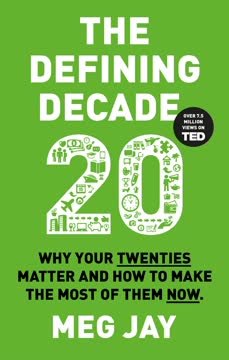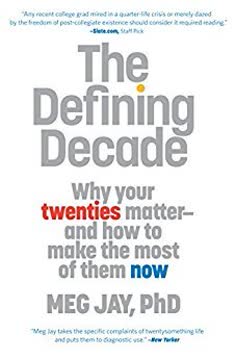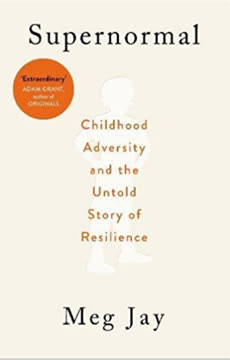Key Takeaways
1. Your Twenties Matter More Than You Think
To a great extent, our lives are decided by far-reaching twentysomething moments we may not realize are happening at all.
Defining decade. The twenties are a critical period for adult development, disproportionately shaping who you become professionally, romantically, and personally. While they may not feel consequential in the moment, the experiences and choices made now have a profound, lasting impact on your thirties and beyond. Researchers studying successful people found that the most autobiographically consequential experiences were heavily concentrated in the twentysomething years.
Not disposable years. Despite cultural messages suggesting the twenties are a time for wandering and delaying adulthood ("thirty is the new twenty"), this decade is a developmental sweet spot. Postponing major life decisions doesn't keep options open; it often limits them later. Many thirtysomethings and fortysomethings regret not being more intentional in their twenties, facing challenges like catching up professionally or struggling with fertility.
Real time. The twenties are real time and should be lived that way. Uncertainty is high, but distraction is not the answer. While hope is good, it's not enough; intentionality and action are required to build the life you want.
2. Build Identity Capital Through Action
Identity capital is what we bring to the adult marketplace.
Personal assets. Identity capital is your collection of personal assets – the investments you make in yourself that become part of who you are. This includes résumé builders like degrees and jobs, but also personal qualities like communication skills, problem-solving abilities, and resilience. It's the currency you use to "purchase" jobs, relationships, and opportunities.
Crisis and capital. Resolving an identity crisis isn't just about introspection; it's about earning identity capital. Erik Erikson, who coined the term "identity crisis," also built his identity through action (teaching, training, writing) during his twenties. Twentysomethings who explore and make commitments build stronger, more realistic identities.
Action over thinking. You can't just think your way through life; you have to do something. Underemployment can be a useful stopgap, but aim for jobs with capital, even if they don't seem glamorous. The longer you delay gaining relevant experience, the harder it is to catch up later, potentially leading to unhappiness and underemployment.
3. Leverage the Strength of Weak Ties
New things almost always come from outside your inner circle.
Urban tribe overrated. While close friends (strong ties) provide support, they often know the same things and people you do. They are less likely to expose you to new information or opportunities. The urban tribe helps you survive, but weak ties help you thrive.
Power of acquaintances. Sociologist Mark Granovetter's research shows that most new jobs and opportunities come from people you know only "occasionally" or "rarely" (weak ties). Because weak ties have fewer overlapping contacts with you, they serve as bridges to different social networks and fresh perspectives.
Make yourself relevant. Networking isn't about being fake; it's about connecting with people who can offer new information or opportunities.
- Do your homework: Know what you want or need.
- Make yourself interesting: Share your relevant experiences and goals.
- Ask for specific, manageable favors: Like Benjamin Franklin asking to borrow a book.
Weak ties are more likely to help if you make it easy and relevant for them, and helping you makes them like you more (Ben Franklin effect).
4. Claim Your "Unthought Known"
Being confused about choices is nothing more than hoping that maybe there is a way to get through life without taking charge.
Paralysis by possibility. Feeling overwhelmed by seemingly endless choices can lead to inaction, like being in the middle of an ocean with no land in sight. This confusion can be a defense against the terror of realizing your life is up to you and the possibilities aren't infinite. It's a way of pretending now doesn't matter.
The jam experiment. Psychologist Sheena Iyengar's research shows that having too many choices (24 jam flavors) leads to fewer decisions than having fewer choices (6 jam flavors). Similarly, twentysomethings often feel they have boundless options, but in reality, their past experiences and skills narrow their viable paths. Recognizing your "six-flavor table" makes action possible.
Reality over fantasy. The "lottery question" (what would you do if you won?) is less useful than asking what you can do well enough to support the life you want, and what you'd enjoy doing for years. This involves acknowledging your "unthought knowns" – truths you sense but avoid facing. Making choices, even uncertain ones, is necessary; not choosing is also a choice with consequences down the road.
5. Beware the Tyranny of the Should
Shoulds can masquerade as high standards or lofty goals, but they are not the same.
External pressure. The "tyranny of the should" is driven by external judgments and ideals about how your life is "supposed" to look (e.g., "My life should look better on Facebook," "I should be saving orphans"). This differs from goals, which are authentic dreams directing you from within. Shoulds create a false dichotomy between perfection and failure.
Facebook comparison trap. Social media often presents curated, idealized versions of others' lives, leading to upward social comparison. This can make twentysomethings feel like failures if their reality doesn't match the perceived "glory days" of their peers online. It fuels the feeling that what you're doing isn't good enough because it's not the "best" thing you see others doing.
Authentic potential. Realizing your potential isn't about achieving external ideals or comparing yourself to others; it's about recognizing how your unique gifts and limitations fit with the world. This often involves doing work that doesn't look glamorous (like a starter job) but allows you to invest in what you have and discover what you're good at. Humility and focusing on the job at hand lead to growth.
6. Pick Your Family Intentionally
What no one tells twentysomethings like Emma is that finally, and suddenly, they can pick their own families—they can create their own families—and these are the families that life will be about.
Beyond friends. While friends provide crucial support, especially for those with difficult family backgrounds, they cannot replace the role of family. Twentysomethings often feel they can't choose their family, but in adulthood, choosing a partner means choosing a family – your in-laws and the family you create.
Second chance. Partnering offers a second chance at family, especially for those who grew up in broken or difficult homes. It's an opportunity to build the caring, involved family life you may have missed. This decision is not just about romance; it's about intentionally selecting the people who will be intertwined with your life for decades.
Ambition for love. Just as you are ambitious about your career, be ambitious about your relationships. Don't settle for "fine" or "fun" if you want a partner who will be a good co-parent or involved in-law. Taking love seriously and being thoughtful about your choices is crucial for long-term happiness, especially if you want to create a strong family unit.
7. Understand the Cohabitation Effect
Couples who "live together first" are actually less satisfied with their marriages and more likely to divorce than couples who do not.
Sliding, not deciding. Cohabitation has increased dramatically, often seen as a way to test a relationship before marriage. However, research shows that couples who live together before engagement are less satisfied and more likely to divorce than those who don't. This is the "cohabitation effect."
Lower standards. Couples often slide into living together for convenience (cheaper rent, easier access to sex/intimacy) without a clear, mutual decision about commitment. Standards for a live-in partner are often lower than for a spouse. This ambiguity can lead to insecurity and conflict.
Lock-in. Moving in together creates "lock-in" through setup costs (shared furniture, pets, routines) and switching costs (hassle of moving out, dividing things). These costs make it harder to leave, even if the relationship isn't right. Couples may slide from cohabitation into marriage because breaking up seems harder than getting married, especially as peers start marrying.
8. Be "In Like" for Lasting Relationships
The more similar two people’s personalities are, the more likely they are to be satisfied with their relationship.
Beyond looks and sex. While initial attraction matters, lasting relationship satisfaction is strongly linked to compatibility, particularly personality similarity. Being "in like" means being alike in ways that matter and genuinely liking who the other person is.
Deal breakers vs. match makers. Obvious similarities like age, education, or religion can be "deal breakers" that help you weed out incompatible partners, but they aren't necessarily "match makers" for long-term happiness. Personality similarity is a stronger predictor of relationship satisfaction.
Personality matters. Consider the Big Five personality traits (Openness, Conscientiousness, Extraversion, Agreeableness, Neuroticism). While you don't need to be identical, significant differences in how you approach the world can create friction. High Neuroticism (anxiety, moodiness, criticism) is particularly toxic for relationships. Understanding personality helps you choose a partner you genuinely like and navigate differences constructively.
9. Your Brain is Still Developing
In our twenties, the pleasure-seeking, emotional brain is ready to go while the forward-thinking frontal lobe is still a work in progress.
Last growth spurt. The brain develops from back to front, with the frontal lobe (responsible for reason, judgment, planning, and impulse control) being the last to mature, typically finishing between ages 20 and 30. This means twentysomethings can be "uneven," capable of high-level thinking but still prone to emotional reactions and difficulty anticipating consequences.
Plasticity and opportunity. The twenties are the capstone of the brain's second critical growth period. Like a child learning language, the twentysomething brain is primed to learn the "language" of adulthood – navigating work, relationships, and uncertainty. Neurons that fire together, wire together; the experiences you have now are literally shaping your brain's structure and function.
Use it or lose it. The new frontal lobe connections you use are strengthened; those you don't are pruned away ("survival of the busiest"). Engaging in challenging work, real relationships, and forward thinking helps wire your brain for adult competence and resilience. Delaying these experiences means missing a prime opportunity for brain development.
10. Confidence Comes From Action, Not Just Feeling
Real confidence comes from mastery experiences, which are actual, lived moments of success, especially when things seem difficult.
Outside in. Confidence isn't something you're born with or that magically appears; it's built through experience. Feeling confident on the inside comes from pointing to things you've done well on the outside. This is called self-efficacy or mastery experience.
Growth mindset. A fixed mindset believes you either "have it" (talent, confidence) or you don't. A growth mindset believes abilities can be developed through effort. Twentysomethings with growth mindsets see challenges and failures as opportunities to learn and improve, building resilience and confidence.
Ten thousand hours. Becoming truly good at something, and thus confident in that area, often requires significant time and effort – roughly ten thousand hours of practice or focused work. This isn't about being a "natural"; it's about putting in the work. Hiding in underemployment or avoiding challenges prevents you from gaining the mastery experiences needed to build real confidence.
11. Get Along and Get Ahead to Grow
Our personalities change more during the twentysomething years than at any time before or after.
Prime time for change. Contrary to older theories, personality is most malleable during the twenties. This decade offers the best chance for significant personal growth and transformation. You can become more emotionally stable, conscientious, socially competent, and agreeable.
Investing in adulthood. Positive personality changes in the twenties come from "getting along and getting ahead" – making commitments to the world around you.
- Work: Engaging in challenging jobs fosters responsibility and competence.
- Relationships: Entering stable partnerships improves social skills and reduces anxiety.
- Goals: Setting and working towards goals provides purpose and builds agency.
Commitment fosters change. These adult commitments shift how you are in the world and who you are inside. Avoiding commitments (like staying chronically single or underemployed) can lead to increased stress, anger, and alienation, hindering personality maturation. Even small steps towards goals and relationships contribute to feeling more settled and confident.
12. Do the Math on Fertility and Time
To achieve great things, two things are needed: a plan, and not quite enough time.
Time is limited. The twenties can feel boundless, but time is not infinite, especially regarding biological clocks. The brain condenses unmarked time, making years pass quickly ("Where did the time go?"). Present bias makes it hard to prioritize future goals over immediate gratification.
Fertility facts. Female fertility peaks in the late twenties and declines significantly after 35, plummeting at 40. While more women have babies later, it's often after costly and emotionally draining fertility treatments that frequently fail. Relying on the "availability heuristic" (knowing a few older moms) ignores the sobering statistics. Male fertility also declines with age.
Plan backward. Don't leave major life goals like marriage and children in a distant, abstract future. Use a timeline to make the future concrete. Envision your life in your thirties or forties and work backward to see what needs to happen now. This helps prioritize actions and avoid the regret of realizing too late that you've run out of time for things that matter most.
Last updated:
FAQ
1. What’s "The Defining Decade" by Meg Jay about?
- Focus on Twentysomethings: The book explores why your twenties are a critical period for shaping your adult life, drawing on Meg Jay’s experience as a clinical psychologist.
- Life’s Most Consequential Decade: Jay argues that the majority of life’s most significant events and decisions happen before age 35, with the twenties being especially pivotal.
- Debunking Cultural Myths: The book challenges the idea that “thirty is the new twenty” and that the twenties are a throwaway decade.
- Practical Guidance: Through research, client stories, and actionable advice, Jay provides a roadmap for making intentional choices in work, love, and personal development during your twenties.
2. Why should I read "The Defining Decade" by Meg Jay?
- Avoiding Regret: The book helps readers understand the long-term consequences of choices (or lack thereof) made in their twenties, preventing future regret.
- Actionable Advice: Jay offers concrete strategies for building a meaningful career, relationships, and sense of self, rather than just abstract encouragement.
- Real Stories, Real Struggles: The book is filled with relatable stories from real clients, making the advice practical and grounded in real-life experiences.
- Empowerment and Clarity: It empowers readers to take control of their lives, make intentional decisions, and see their twenties as a time of opportunity rather than confusion.
3. What are the key takeaways from "The Defining Decade" by Meg Jay?
- Your Twenties Matter: Choices made in your twenties disproportionately shape your career, relationships, and overall life trajectory.
- Intentionality Over Passivity: Being intentional and proactive is crucial; drifting or waiting for things to happen can lead to missed opportunities and later regret.
- Build Identity Capital: Invest in experiences, skills, and relationships that add value to your personal and professional identity.
- Work and Love Are Foundational: Early career moves and relationship choices have lasting impacts, so they deserve serious attention and effort.
4. What is "identity capital" in "The Defining Decade" and why is it important?
- Definition: Identity capital refers to the collection of personal assets—skills, experiences, relationships, and credentials—that you accumulate and invest in your future.
- Building Blocks of Adulthood: These assets help you stand out in the job market and in relationships, forming the foundation of your adult identity.
- Crisis and Capital Together: Jay argues that exploration (crisis) and commitment (capital) should go hand in hand for a strong sense of self.
- Practical Application: Taking jobs, pursuing interests, and making commitments—even if imperfect—are ways to build identity capital and move forward.
5. How does Meg Jay in "The Defining Decade" challenge the idea that “thirty is the new twenty”?
- Critical Period Argument: Jay presents research showing that the twenties are a unique window for growth and change that can’t be easily replicated later.
- Delayed Action Consequences: Waiting until your thirties to “get serious” often leads to compressed timelines, increased stress, and fewer options.
- Cultural Myths Debunked: The book critiques the glamorization of extended adolescence and the notion that you can delay adulthood without consequence.
- Real-Life Examples: Stories from clients in their thirties and forties illustrate the regret and challenges of trying to “catch up” after a passive twenties.
6. What does "The Defining Decade" by Meg Jay say about work and career choices in your twenties?
- Early Jobs Matter Most: The first jobs and career moves in your twenties have an outsized impact on long-term earning potential and career trajectory.
- Underemployment Risks: Prolonged underemployment or “fun” but dead-end jobs can lead to depression, lost motivation, and a difficult path to recovery.
- Take the Job with Capital: Jay advises choosing opportunities that build identity capital, even if they seem less glamorous or pay less initially.
- Weak Ties and Networking: Leveraging weak ties (acquaintances) is often more effective for career advancement than relying solely on close friends.
7. How does "The Defining Decade" by Meg Jay address relationships and love in your twenties?
- Relationship Choices Are Defining: Who you date and how you approach relationships in your twenties can set the stage for your future happiness and family life.
- Age Thirty Deadline: Many people experience a sudden panic about marriage and family as they approach thirty, often leading to rushed or poor decisions.
- Cohabitation Effect: Living together before engagement can increase the risk of divorce due to “sliding, not deciding” into commitment.
- Picking Your Family: Jay emphasizes the importance of being intentional about choosing partners and building the family you want, rather than just letting things happen.
8. What is the significance of "weak ties" in "The Defining Decade" by Meg Jay?
- Definition: Weak ties are acquaintances or distant contacts, as opposed to close friends or family.
- Source of Opportunity: Research shows that weak ties are more likely to provide new job leads, information, and opportunities than strong ties.
- Expanding Your Network: Reaching out to weak ties can help you break out of insular social circles and access new possibilities.
- Practical Advice: Jay encourages readers to overcome discomfort with networking and to intentionally cultivate and use weak ties for career and personal growth.
9. How does "The Defining Decade" by Meg Jay address the role of the brain and psychological development in your twenties?
- Brain Development Continues: The frontal lobe, responsible for decision-making and forward thinking, continues to mature into the late twenties.
- Critical Period for Change: The twenties are a “second and final” critical period for brain development, making it the best time for learning and personal growth.
- Use It or Lose It: Experiences, challenges, and commitments in your twenties shape the brain’s wiring for adulthood; passivity can lead to missed developmental opportunities.
- Emotional Regulation: Learning to manage emotions and stress at work and in relationships is a key part of maturing during this decade.
10. What advice does Meg Jay give in "The Defining Decade" for overcoming indecision and uncertainty in your twenties?
- Action Over Rumination: Jay stresses that you can’t “think your way through life”—taking action, even imperfectly, is the only way to gain clarity and confidence.
- The Jam Experiment: Too many choices can be paralyzing; focus on your real, viable options rather than fantasizing about endless possibilities.
- The Unthought Known: Pay attention to your own hidden desires and truths, even if they’re scary or uncertain, and use them to guide your decisions.
- Timeline and Planning: Creating a concrete timeline for your goals helps make the future feel real and actionable, reducing anxiety and procrastination.
11. What are the main pitfalls or “shoulds” that Meg Jay warns against in "The Defining Decade"?
- Tyranny of the Should: Many twentysomethings are trapped by external expectations—what they “should” do, be, or achieve—rather than pursuing authentic goals.
- Search for Glory: Chasing unrealistic or idealized versions of success (often fueled by social media) can lead to dissatisfaction and paralysis.
- Settling vs. Starting: Avoiding decisions to “keep options open” often leads to settling for less later, rather than starting on a path and building from there.
- Comparison Trap: Comparing your real life to others’ curated social media feeds can create unnecessary anxiety and a sense of failure.
12. What are the best quotes from "The Defining Decade" by Meg Jay and what do they mean?
- “The unlived life is not worth examining.” – Emphasizes that action and experience are more important than endless self-reflection.
- “Thirty is not the new twenty.” – Reminds readers that delaying adulthood has real consequences and that the twenties are uniquely important.
- “Identity capital is how we build ourselves—bit by bit, over time.” – Highlights the importance of accumulating skills, experiences, and relationships that shape who you become.
- “Claim your adulthood. Be intentional. Get to work. Pick your family. Do the math. Make your own certainty.” – Summarizes the book’s call to action: take responsibility for your life and future, starting now.
Review Summary
The Defining Decade receives mostly positive reviews, with readers appreciating its insights on navigating one's twenties. Many find it helpful for career and relationship guidance, though some criticize its narrow perspective. Readers value the book's emphasis on intentional decision-making and long-term planning. While some find it stressful or limiting, others consider it a crucial read for twentysomethings. The book's relatable anecdotes and science-backed arguments resonate with many, inspiring them to take their twenties seriously and make purposeful choices for their future.
Similar Books
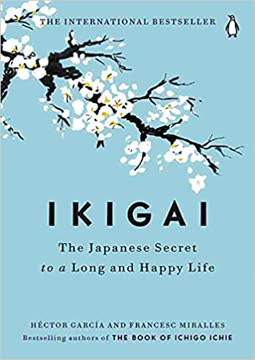

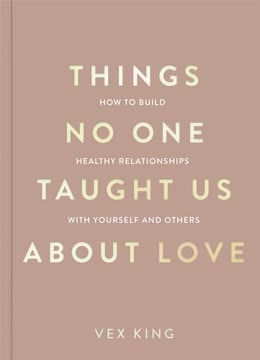
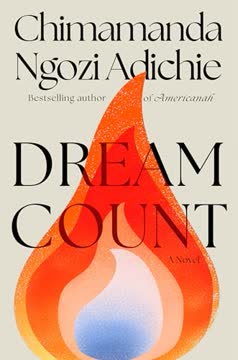
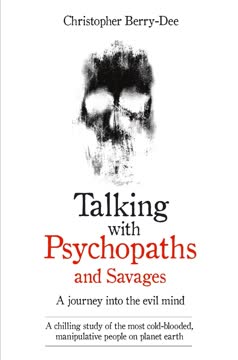

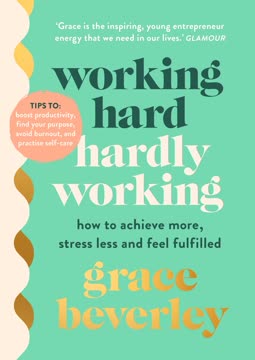

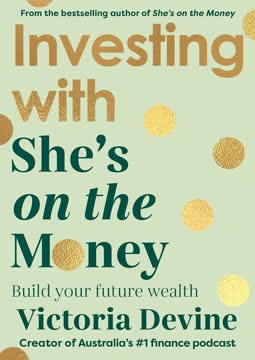
Download PDF
Download EPUB
.epub digital book format is ideal for reading ebooks on phones, tablets, and e-readers.
